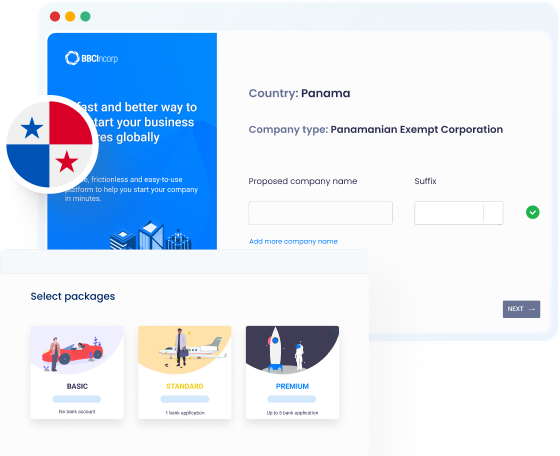Budget-Friendly Offshore Company Formation Designed Around Your Needs
Budget-Friendly Offshore Company Formation Designed Around Your Needs
Blog Article
Browsing the World of International Business: Insights on Offshore Company Formation
Offshore Company Formation provides a strategic opportunity for international organization operations. It supplies notable advantages, such as tax optimization and enhanced privacy. However, the process is not without its difficulties. Understanding the intricacies of regulative needs and numerous territories is necessary. As companies take into consideration these choices, the steps included can significantly influence their long-lasting success. What are the vital aspects that can lead to efficient overseas administration?
Comprehending Offshore Companies: Meaning and Function
Offshore companies have come to be a focal factor in international organization discussions due to their special legal and economic structures. These entities are established in territories outside of the proprietor's country of home, commonly with positive regulative settings. Normally, overseas business offer various objectives, such as property security, tax optimization, and improved privacy. They can run in numerous sectors including finance, trade, and technology, giving versatility for global operations.The defining characteristic of an offshore Company is its ability to conduct organization worldwide while profiting from decreased tax obligation responsibilities and regulatory burdens. This framework interest business owners and capitalists seeking to expand their portfolios and manage dangers effectively. In addition, numerous overseas territories supply incentives to attract foreign financial investment, leading to a boost in the Formation of these companies. Recognizing the meaning and objective of overseas companies is vital for maneuvering through the intricacies of international commerce and capital flow.
Key Benefits of Offshore Company Formation
The Formation of an offshore Company provides several compelling benefits that draw in financiers and entrepreneurs alike. One of the key advantages is tax obligation optimization; lots of territories give beneficial tax rates or exceptions, allowing businesses to make best use of revenues. Additionally, offshore companies often take pleasure in better confidentiality, as numerous territories have rigid privacy regulations shielding the identifications of Company owners and shareholders.Another substantial advantage is possession defense. Offshore entities can safeguard assets from political instability and economic slumps in the owner's home nation. Additionally, these business can help with global profession, supplying simple access to international markets and simplifying cross-border transactions.The flexibility in corporate structure additionally allures to organization owners, as offshore firms can be customized to fulfill particular operational requirements. On the whole, the strategic Formation of an overseas Company can bring about improved economic protection, operational efficiency, and a robust worldwide presence.

Usual Difficulties in Establishing Offshore Entities
Establishing overseas entities provides a number of difficulties that services have to browse. Key issues consist of governing conformity, which can differ considerably across territories, and the effect of social differences on operations. Furthermore, companies should consider the expenses and dangers connected with preserving an offshore visibility, which can impact total viability.
Governing Conformity Issues
When they look for to develop overseas entities, navigating regulative compliance issues poses substantial difficulties for services. Each jurisdiction has its very own set of regulations and guidelines, which can differ commonly and might be tough to navigate. Business frequently deal with difficulties related to tax compliance, anti-money laundering guidelines, and reporting requirements. Furthermore, modifications in international tax obligation legislations can develop uncertainty, making it essential for businesses to stay updated on conformity responsibilities. Failing to comply with these policies can cause extreme fines, consisting of fines and reputational damages. Consequently, recognizing the legal framework and engaging with local professionals is essential for successful overseas operations, ensuring that services can operate within the boundaries of the legislation while enhancing their global approach.
Social Differences Effect

Expense Factors To Consider and Threats
Steering through the financial landscape of offshore entity Formation provides various cost considerations and fundamental risks. Preliminary arrangement costs commonly consist of lawful costs, registration expenses, and conformity fees, which can gather considerably. Furthermore, continuous maintenance costs such as yearly charges and bookkeeping solutions need to be factored in. Fluctuating regulatory environments in various territories pose risks, possibly leading to legal complications or unanticipated costs. Businesses might also run into difficulties associated with tax, financial, and reputational concerns, which can impact productivity and functional performance. Prospective business owners have to perform comprehensive due persistance and financial forecasting to minimize these risks and guarantee lasting development. Recognizing these expense factors to consider is essential for effective overseas organization ventures.
Actions to Establish an Offshore Company
Establishing an overseas Company includes a number of crucial actions that need careful factor to consider. Trick factors include making certain and picking the ideal jurisdiction compliance with regional laws, together with collecting needed documents. Comprehending these components is crucial for a successful offshore company arrangement.
Choosing the Right Jurisdiction
Choosing the right territory is important for anyone looking to establish an overseas Company, as it can considerably affect the business's legal commitments, tax liabilities, and operational ease. Different aspects need to be taken into consideration, including the political stability, regulatory atmosphere, and tax motivations supplied by prospective jurisdictions. Popular choices frequently consist of countries with positive tax regimens, such as the British Virgin here Islands or Cayman Islands, as a result of their reduced or no tax prices. Additionally, the ease of working and the credibility of the territory can affect investor confidence and market accessibility. Ultimately, a well-informed choice based on detailed research study will guarantee the overseas Company is positioned for lasting success and compliance with global requirements.
Required Documentation and Conformity
When establishing up an offshore Company, recognizing the needed documents and compliance needs is vital to ensure a smooth procedure. Trick documents normally consist of a certificate of incorporation, a memorandum and articles of association, and evidence of identity for supervisors and shareholders. Some territories might require additional info, such as organization strategies or bank recommendations. Compliance with local laws is important, which typically involves assigning a registered agent and keeping an authorized office. Routine coverage and adherence to tax obligation commitments must additionally be considered. Failure to adhere to these needs can cause charges and even dissolution of the Company. Comprehensive preparation and consultation with legal professionals can help browse these intricacies effectively.
Selecting the Right Jurisdiction for Your Offshore Company
How can one figure out one of the most appropriate jurisdiction for an offshore Company? Choosing the ideal jurisdiction requires careful consideration of multiple factors. The legal and tax obligation setting plays a crucial function; territories with favorable tax obligation regimens may enhance company success. In addition, the political security and financial climate of an area can affect lasting company viability.Another important element is the availability of monetary services and financial facilities, which assist in smooth operations. Potential company proprietors must also consider the ease of operating, including the rate of registration and the clarity of regulations.Furthermore, language obstacles and cultural differences can impact operations; consequently, straightening with a territory that aligns with business goals and individual convenience is crucial. Eventually, comprehensive study and professional guidance can guide entrepreneurs in making a notified choice that straightens with their tactical purposes.
Conformity and Regulative Considerations

Finest Practices for Taking Care Of an Offshore Company
Handling an offshore organization needs strategic preparation and meticulous execution to maximize performance and reduce dangers. Establishing a robust compliance framework is vital to browse varying regulations across jurisdictions. Regular audits and threat assessments help determine potential vulnerabilities.Moreover, leveraging regional expertise through partnerships with local specialists can improve operational efficiency and cultural understanding. Using technology, such as cloud-based management systems, enhances communication and data management, allowing much better decision-making. Furthermore, preserving transparent financial documents and guaranteeing timely tax filings are important to maintain the Company's integrity. Investing in staff training and growth cultivates an experienced workforce, promoting advancement and adaptability.Finally, developing clear efficiency metrics and crucial performance indicators (KPIs) aids examine service development and inform strategic modifications. By sticking to these ideal techniques, firms can efficiently manage their offshore operations, ensuring lasting success and sustainability in a competitive worldwide marketplace.
Often Asked Questions
What Is the Cost of Developing an Offshore Company?
The expense of developing an overseas Company varies extensively depending on jurisdiction, lawful requirements, and services needed. Usually, expenses can vary from a few hundred to several thousand dollars, including enrollment, conformity, and yearly charges.
The length of time Does It Take to Establish an Offshore Entity?
The moment needed to develop an offshore entity varies substantially, commonly ranging from a few days to a number of weeks (offshore company formation). Variables influencing this period consist of jurisdiction, needed documents, and the efficiency of the service copyright involved
Can Individuals Type Offshore Companies Without a Business Partner?
People can certainly develop overseas firms without a company companion. Many territories enable single-member entities, equipping business owners to establish and manage their businesses independently, while still gaining from potential tax obligation benefits and lawful defenses.
Are There Any Kind Of Tax Obligation Benefits for Foreign Investors?

What Type of Organizations Commonly Use Offshore Companies?
Offshore business are regularly made use of by various fields, including e-commerce, technology, and financing. These entities typically offer objectives such as property protection, tax optimization, and privacy, attracting both private business owners and international corporations. Offshore firms have actually come to be a focal point in global service conversations due to their distinct legal and financial frameworks. They can operate in numerous industries consisting of money, trade, and modern technology, supplying flexibility for global operations.The defining feature of an offshore Company is its ability to conduct organization globally while benefiting from minimized tax liabilities and regulative worries. Additionally, overseas firms typically delight in higher discretion, as lots of jurisdictions have rigid privacy laws securing the identifications of Company proprietors and shareholders.Another substantial benefit is property defense. These business can promote worldwide trade, offering very easy accessibility to international markets and simplifying cross-border transactions.The flexibility in company framework likewise allures to company proprietors, as overseas firms can be customized to meet specific functional requirements. Picking the best territory is essential for any person looking to establish up an overseas Company, as it can significantly impact the service's lawful commitments, tax responsibilities, and operational convenience.
Report this page